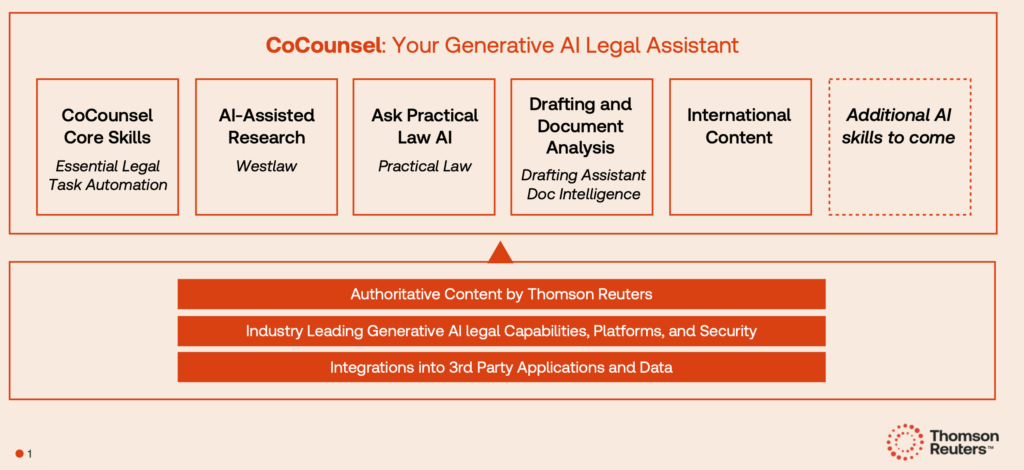
CoCounsel, the GPT4-based chat interface developed by Thomson Reuters for lawyers, will now roll out in all directions as a ‘new way to access products through a single GenAI assistant with applications across Legal, Tax, Risk & Fraud, and Media’. In short, CoCounsel everywhere…! (And more on what it all means below.)
CoCounsel was the brand name originally given to the GenAI assistant that supported legal professionals – this product is now called CoCounsel Core. Meanwhile, Thomson Reuters will use CoCounsel as the ‘common nomenclature’ for its single GenAI assistant available across its portfolio.
Got it? But, anyway, let’s just call it all CoCo for short.
The legal research giant also said that today it is adding new GenAI skills to CoCo’s capabilities through Westlaw Edge UK.
OK, that’s enough branding news. Does this have any deeper meaning? Yes.
As TR says, it found that ‘81% of professionals believe AI could be applied to their work’. And as they’ve already done a lot of hard LLM yards on legal, then why not spread it out to cover other professional areas as well – which TR also caters for.
Brad Lightcap, COO at OpenAI – which works with TR on their LLM projects – said: ‘By powering solutions like CoCounsel….we make knowledge workers more creative and productive.’
‘AI automates routine tasks and makes it possible to quickly analyze huge amounts of data – but even more importantly, it helps people come up with new ways to solve complex problems,’ he added.
For example, this will manifest itself as:
- Checkpoint Edge with CoCo for tax professionals, delivering TR proprietary content, which will ‘enhance efficiency for seasoned researchers and enabling inexperienced researchers to work with reduced supervision’.

And as noted:
- Westlaw Edge UK with CoCo – The first Thomson Reuters generative AI legal research offering in the UK streamlines the initial phase of legal research, ‘allowing customers to ask complex questions in natural language and delivering a synthesized answer grounded in trusted Westlaw content with detailed insights from top results including a list of key cases, legislation, and related topics.’
- And, there are CoCo Integrations with Microsoft 365 – so that ‘CoCo will connect professionals with the tools they use daily starting with Microsoft 365 – e.g. Teams, Word, Outlook, and SharePoint to accelerate research, drafting and review.’
Overall then, deeper integrations of the LLM capability with the world that lawyers and other professionals live in i.e. Word, with the plan to additionally stretch this interactive Q&A approach to other professional areas, with tax already launching.
Is this a big deal?
It’s certainly a very logical move. It’s a case of ‘Have LLM-driven chat interface will use it’, and then to try and stretch it across every possible other part of the company’s offering.
It also helps to keep users within the TR CoCo space, as they work with TR products and move back and forth between Word and Teams. The net result is a much more integrated workspace that will hold users there for longer.
And staying there longer is what all digital platforms want from you, because the more you’ll use it, the more dependent you’ll get, and the more you’ll start to nibble at new features that appear.
As to the big stretch to other sectors. Totally logical as well. It will need to be adapted and tuned to meet specific content needs of different fields, but why not if they already have the content for those professionals, e.g. in tax?
It also heats up the battle with LexisNexis and its own LLM-driven capabilities, and it would not be impossible if this was seen internally by TR’s management group as helping on the legal sector side to keep companies such as Harvey from making too much of an impact, given how fast they are growing.
To conclude: TR may have been slow to adapt to the first wave of AI back in the mid-2010s, but it’s certainly not going to let this happen again. Plus, this is still early days. More to come for sure.
Let us know what you think of the experience.